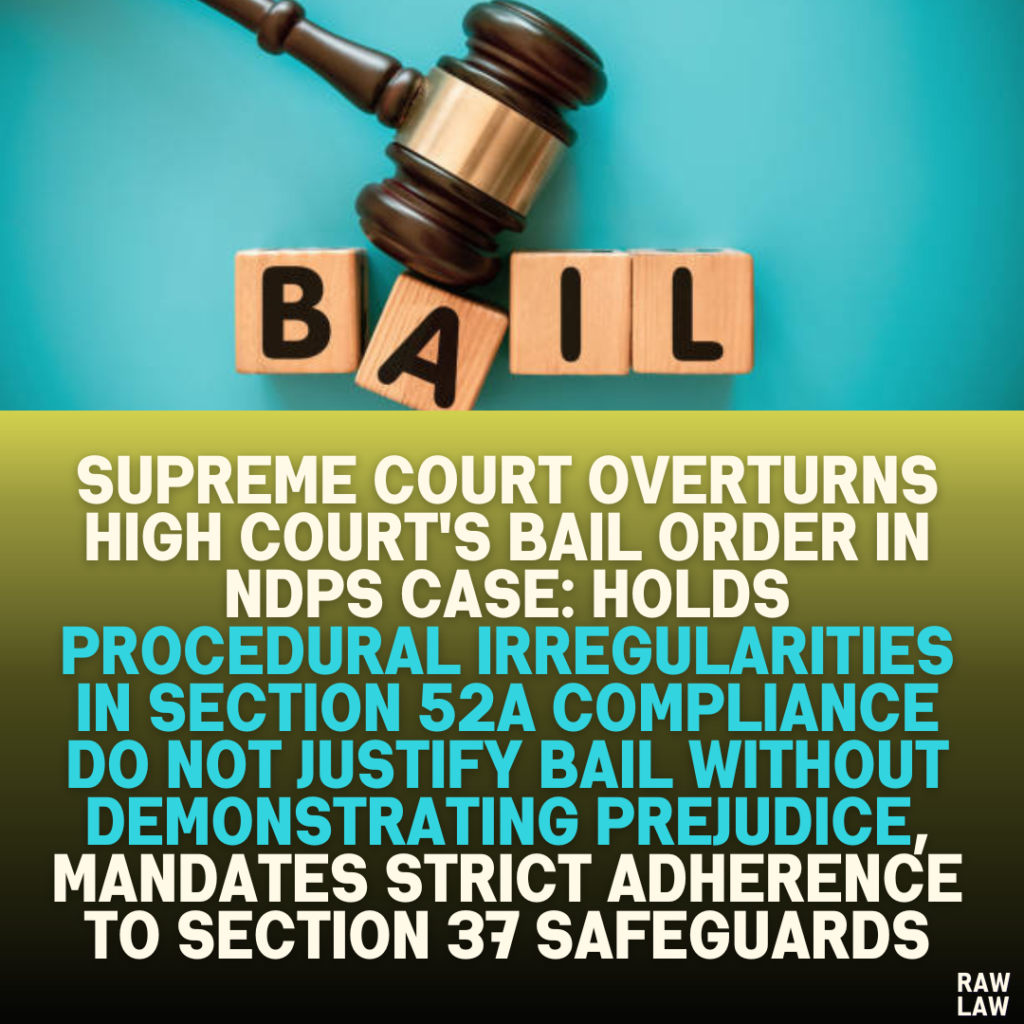Court’s Decision
The Supreme Court overturned the High Court’s decision that granted bail to an accused in a narcotics case, citing delayed compliance with Section 52A of the NDPS Act. The Court emphasized that procedural irregularities in Section 52A compliance do not vitiate the trial or justify bail, unless serious prejudice is caused to the accused. The case was remanded to the High Court for a fresh determination of the bail application, with directions to assess the matter in line with Section 37’s mandatory requirements.
Facts
- Seizure of Contraband: The Narcotics Control Bureau (NCB) seized substantial quantities of psychotropic substances, including 13,200 strips of Tramadol tablets, 15,000 Zolpidem tablets, and 19,440 Tramadol tablets, in multiple raids during February and March 2022.
- Accused Implicated: Disclosures by co-accused led to the arrest of the respondent, who was accused of facilitating the illegal shipment of narcotics.
- Charges: The respondent, along with others, was charged under Sections 8, 22(c), 23(c), and 29 of the NDPS Act.
- High Court’s Bail Grant: The High Court granted bail on the sole ground of delayed compliance with Section 52A of the NDPS Act, raising concerns about the potential tampering of samples.
Issues
- Procedural Compliance: Can delayed compliance with Section 52A invalidate prosecution or justify bail?
- Adherence to Section 37: Did the High Court appropriately apply the mandatory conditions under Section 37 for granting bail in NDPS cases?
Petitioner’s Arguments
- Non-Compliance Not Fatal: Procedural delays in Section 52A compliance are not grounds for granting bail unless material prejudice is demonstrated.
- Mandatory Conditions: Section 37 requires satisfaction that the accused is not guilty and will not commit further offenses. The High Court did not evaluate these conditions.
- Strong Evidence: The seized contraband and supporting evidence established a prima facie case against the accused, warranting denial of bail.
Respondent’s Arguments
- Delay Raises Doubt: Non-compliance with Section 52A created reasonable apprehension of tampering, weakening the prosecution’s case.
- Fairness Compromised: The integrity of the seized samples was questionable due to procedural lapses, warranting the accused’s release on bail.
Analysis of the Law
- Section 52A of the NDPS Act:
- Introduced in 1989 to ensure early disposal of seized narcotics, minimizing risks of theft, substitution, and storage issues.
- Requires preparation of an inventory, certification by a magistrate, and photographic evidence or representative samples of seized substances.
- Delayed compliance constitutes a procedural irregularity, not an illegality, and does not vitiate prosecution unless prejudice is shown.
- Section 37:
- Mandates strict conditions for granting bail in NDPS cases.
- Courts must be satisfied that there are reasonable grounds to believe the accused is not guilty and will not commit further offenses.
- These conditions are cumulative and cannot be waived, even in the face of procedural lapses.
- Admissibility of Evidence:
- Evidence obtained through procedural irregularities is not inadmissible unless tampering or prejudice is demonstrated.
- The Supreme Court upheld the principle that procedural safeguards are meant to ensure fairness, not to provide technical grounds for acquittal.
Precedent Analysis
- State of M.P. v. Kajad: Reinforced the mandatory nature of Section 37 in denying bail.
- NCB v. Mohit Aggarwal: Clarified that custody duration and procedural delays are not sufficient grounds for bail under the NDPS Act.
- Pooran Mal v. Director of Inspection: Established that evidence obtained through procedural lapses remains admissible unless prejudice is proved.
- Mohanlal Case: Highlighted the importance of compliance with Section 52A but did not support the conclusion that delayed compliance invalidates prosecution.
Court’s Reasoning
- Purpose of Section 52A:
- Aimed at expeditious disposal of seized narcotics to address storage and theft concerns.
- Compliance delays are procedural and do not undermine the legality of seizures or subsequent prosecution.
- High Court’s Errors:
- Granted bail based solely on procedural delay without evaluating evidence or compliance with Section 37.
- Ignored statutory presumptions under Section 54, which place the burden on the accused to rebut possession charges.
- Procedural Irregularities:
- Mere procedural lapses cannot vitiate the trial or justify bail without proof of prejudice or tampering.
- Evidence like seizure memos, panchanamas, and forensic reports remains primary and admissible.
Conclusion
The Supreme Court remanded the case to the High Court, directing it to reassess the bail application based on merits and in compliance with Section 37. It extended the respondent’s bail by four weeks, allowing the High Court to re-evaluate the matter within that period. The case was assigned to a different bench for reconsideration.
Implications
- Strict Enforcement of NDPS Act: The ruling underscores the rigorous application of procedural and evidentiary safeguards in narcotics cases, prioritizing societal interests over technical lapses.
- Judicial Discipline: Reinforces the principle that bail decisions in NDPS cases must adhere strictly to statutory requirements, ensuring a balance between individual rights and public safety.
- Clarification on Section 52A: Procedural delays in compliance with Section 52A are not fatal to prosecution, providing clarity on its application.
This judgment strengthens the NDPS Act’s enforcement framework, emphasizing accountability, procedural rigor, and the importance of statutory safeguards.



